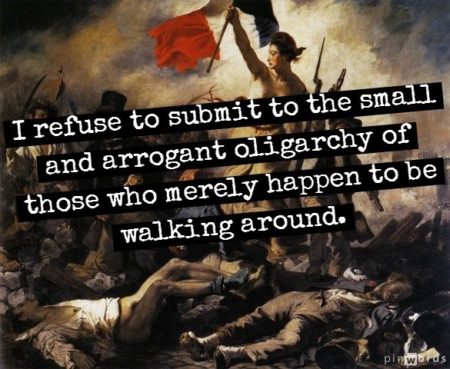
Tradition brings a sense of belonging and comfort. It brings families and friends together in a spirit of kinship. However, we need to balance tradition with our independent thought. When our customary ways of doing things become restrictive and block our growth, we need to revisit them and question if they’re still working for us and modify it or break away from tradition . (Estimated reading time: 7 minutes)
“Tradition is a guide and not a jailer.”
— W. Somerset Maugham
Close your eyes for a minute and remember one of your favorite family traditions that you grew up with.
Picture yourself immersed in the traditional practice along with your loved ones.
Notice all the colors, textures, smells and sounds around you.
Now focus on how you feel. Do you experience feelings of warmth, nostalgia and comfort?
These cherished traditions are a major source of joy. Like a cozy blanket, they give a sense of familiarity and comfort. They represent tried and tested ways of living that have been passed on by our ancestors in previous generations.
In fact, the definition of tradition is “the transmission of customs or beliefs from generation to generation, or the fact of being passed on in this way”.
Traditional practices and beliefs that are rooted in wisdom and practicality can ground us and solidify our identity. When done in the spirit of love and sharing, they provide opportunities to bond with our friends, family and community and come together to celebrate life.

The world is a mosaic of diverse cultures, and traditions are at heart and soul of each of those cultures. When you travel to foreign countries, you have the opportunity to immerse yourself in their world. In China, you witness tea ceremonies; in Africa, you watch tribal dances; in Europe, you attend summer festivals; and in the US, you partake in Thanksgiving meals. When you do this, you’ll be convinced of the splendor in global traditions.
But how do you know whether or not certain traditions, in your own culture, are worth following anymore? At what point do you draw the line so that you avoid the shadow aspects of following traditional values? When is it appropriate to break away from tradition?
The simple answer is when following a certain tradition doesn’t serve you anymore. If it’s limiting your personal growth, stifling your freedom of expression, and preventing you from being your authentic self, it might be time to walk away. It might feel outdated, morally wrong, and something that just does not resonate with your values and personal philosophy.
Traditions are meant to be a resource of collective wisdom to make our life simpler and more manageable. They’re not supposed be a handcuff that bind us to outdated ways of doing things or archaic dogma that isn’t serving your highest good. They should not be a burden that’s getting in the way of you pursuing your desires and reaching your highest potential.

Throughout history, we’ve seen many examples of pioneers who were unafraid of questioning the status quo when it wasn’t serving humanity. Martin Luther King, Gandhi, Eleanor Roosevelt and Che Guevara are exemplars of non-conformists who had the foresight to see how corrupt regimes were using tradition as a way to control others. They knew that they had to break away from tradition.
They used their voices to enlighten others on how to stop mindlessly following traditions and engage in independent thinking so that they can question outdated beliefs and work towards reforming them. Shifting longstanding traditions often requires a lot of resistance on a mass scale to change, but once these revolutionaries were able to inspire others with their passion, there was no turning back.
The stories of these historical figures can motivate us to take the time to evaluate the traditions that we grew up with to see if it’s still in sync with our current values and perspectives.
As you develop confidence in the person that you’ve become, you’ll find it a lot easier to question anyone who asks you do things in a certain way, just because “it’s how it’s always been done”.
It’s makes no sense to follow tradition simply because we’re habituated to it and everyone else around us is doing it, when we’ve lost sight of the purpose and intent of the tradition.
Tradition, no matter for how long it has been practiced, should never force you to follow decisions that have been made by someone else who is being influenced by outdated belief systems and a fear of change.

I have grown up in a culture and society where I’ve seen this happen all too often. I’ve always been a bit of a maverick so it’s easy for me to notice when people are selling themselves short because they’re worried about creating waves and being rejected for not following tradition. They’re willing to do anything to avoid displeasing their clan, including sacrificing their dreams.
I didn’t want this to happen to me so I set healthy boundaries to prevent the voices of tradition to overpower the wisdom of my inner voice. I didn’t want anything or anyone to prevent me from expressing my truth and sharing my gifts with the world. I focused on building a healthy relationship with myself and growing an awareness of my purpose.
I believe that being true to yourself will ultimately bring you a feeling of personal power that comes from owning your story. Even if you didn’t get your desired outcome after breaking tradition, at least you used your own thought process to weigh the pros and cons. Real growth only occurs when you learn from your mistakes and you take responsibility for your choices.
Now I’m not suggesting that we should get rid of tradition entirely but that we have the courage and smarts to find that balance between traditional and independent thought. It doesn’t have to be black and white. Upon due consideration, you can keep some traditions that work for you, modify some to accommodate new facts, or abandon some altogether. Do whatever resonates with you and your ideals.
Here are five steps that you can take to develop a balanced approach towards traditions and decide when it’s right to break away from tradition:
1. Review the traditions that you’ve grown up with: Every country, culture and family have their own unique traditions. You probably grew up with some traditional practices and belief systems that you’ve grown accustomed to. I suggest reviewing those traditions by creating a list of the most prominent ones that come to mind and asking yourself the following questions:
Which traditions were you most fond of? Which ones did you not particularly like and would like to break away from tradition? Can you still resonate with those traditions? If not, why do you still follow them? I loved my family’s ritual of taking long summer vacations, during which we created wonderful memories together, but I didn’t like joining my dad on his weekly visit to the fish market!
2. Look at how your traditions are affecting your life right now: Look at how your current belief system and conduct is influenced by your traditions values. How is it affecting your approach towards work and your relationships with others? For example, can you trace your current workaholic patterns to the hard-nosed, career-driven family that you grew up in, where work was always given priority over everything else? Do you date people from the same race, religion and socio-economic status because of your community’s beliefs on marrying your own kind?
3. Preserve the good aspects of your traditions: As you browse through your list of practices and beliefs that you’ve traced from your formative years, figure out which ones you’d like to keep. Pick out the traditions that elicit those warm and feel-good sentiments within you. You can also choose the ones that are serving you and supporting your growth as an individual. Holiday rituals such as cooking turkey during Thanksgiving or participating in volunteer work with your family are examples of classic traditions that you could preserve because they still fit within your moral framework and make you feel good.
4. Transform the traditional beliefs that aren’t working for you: Weed out traditional beliefs that are leading to patterns of behaviors that aren’t working for you. This isn’t always easy to do, especially if it’s all you’ve ever known in your life and if you’re conscious of what others might think of you if you walk away from tradition. You’ll have to muster the courage to challenge and transform those traditions in a way that can support the fulfillment of your needs. If you grew up in family of lawyers and you’re expected to follow the family tradition, you have to be brave enough to let your family know that your heart is not in the field of law and that what you really want is to pursue an artistic profession.
5. Celebrate global traditions: Immersing yourself in other cultural traditions will give context to your own origins. I suggest visiting cultural events, participating in festivals and holidays, and traveling to other countries. Keep an open mind as you absorb all the stories, rituals, folklore and myths that give rise to the traditional practices you witness. If you come from a place of curiosity, understanding and tolerance, participating in world traditions can turn out to be a delightful learning experiences.
To break away from tradition requires the heart of a warrior, the spirit of an explorer, and the mind of an inventor. Tap into the energies of these archetypes as you blaze your own trail, knowing that it’s creating a ripple effect that can awaken the consciousness of others for years to come.
All my best on your journey,
Seline

Question for you: What are the challenges that you face when you’ve tried to break away from tradition?
Did you like this post? Sign up below and I’ll send you more awesome posts like this every week.

Thank you so much…i realLy feel better…your words like a medicine to me…..again thanks a lot
Traditions have been a big part of my life and my family. I grew up in a very strict religious household, we had a lot of rules and things we did simply because that was how it was and how we had always done it.. I’ve been labeled the black sheep of the family because I do not want to follow all the traditions simply because we did it in the past- so this article was very helpful to me! I can relate to you Seline…we’re the brave ones and we should continue to set an example to other women who are from conservative societies…thanks for all you do.
Noor